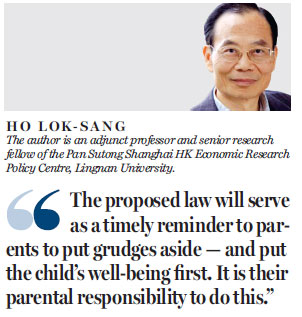We should all embrace the parental responsibility model
Updated: 2016-03-22 08:34
By Ho Lok-Sang(HK Edition)
|
|||||||
A divorce is often not just a matter of two people deciding to end their marriage - divorce can also have a serious impact on their children. But a proposed law reform promises to reduce the effect on children hit by a divorce. The four-month public consultation on the bill will conclude this coming Friday.
Essentially, the proposal is to replace a parent-centric child custody model with a child-centric parental responsibility one. The former emphasizes which parent has the "right" of custody. The latter emphasizes the right of the child to parental care. Although a couple may be divorced, they are still parents and both will continue to have responsibility in caring for their children.
Still, there is the possibility that both parents may desire to gain custody of a child. In the past, the court would decide which parent should gain custody and which parent would not. If the Children Proceedings (Parental Responsibility) Bill is passed, a court may still have to decide with whom the child will stay, but the main consideration will no longer be which parent has the right to have custody. Instead, the best interests of the child will be stressed. If the parents cannot decide what will work best for the child, then the court will help out. The child will be the winner.
The proposed bill, if passed into law, will also be educational. The child will take center stage - and this is as it should be. Of course, a marriage break-up may not always be amicable; parents may have grudges against each other. The proposed law will serve as a timely reminder to parents to put such grudges aside - and put the child's well-being first. It is their parental responsibility to do this. In a sense, if the child "wins", the parents will too. This is because caring parents want their children to live a happy life, and grow up to be healthy and strong.
I am a believer in parenting education. I have seen too many tragedies which occurred because parents did not know better. Recently, I heard a family counselor reveal a rather tragic story on radio. A 4-year-old child was told that because she did not behave properly her parents had to break up. The thoughtless statement created such a sense of guilt the child developed suicidal tendencies. Disagreement over childcare when a child "misbehaves" is a common source of arguments between parents. What makes it tragic is that parents who are fighting could just as easily be caring parents and each believes they know better than their spouse. A disagreement can turn into an argument and an argument can then develop into a fight. The child is victimized. If the parents decide to break up, the child is victimized a second time. When a parent tells a child it was their fault the child is victimized a third time. This is disastrous.
Contesting the right of custody of a child in a court is often damaging to all parties. The contestants may develop a sense of enmity toward each other. This gives a very bad example to the child. If the proposed bill is passed into law, the court will still have to decide with which parent the child is going to live through a "child arrangements order". But following the best interests principle, this decision will be made in the light of what works best for the child, rather than which parent has a greater right to custody. There will then be no "loser" as the parent who "loses" custody presumably also wants the child to have the best care and opportunities after the marriage break-up. The parent who does not live with the child not only enjoys access to the child, but also is expected to be involved in major decisions affecting the child's well-being and future. This includes acting independently in relation to the day-to-day care of the child.
Although parents are expected to love and care for their children, in real life child abuse and parental neglect are possible. According to the bill, the court's decision about with whom a child is going to live will be made in the best interests of the child. Factors to be considered will include the views of the child, the child's physical, emotional and educational needs, the nature of the relationship of the child with each of the child's parents and with other people; the child's age, maturity, sex, social and cultural background, as well as other relevant characteristics; and the possibility of child abuse and practical considerations, among other factors.
The Labour and Welfare Bureau had conducted a public consultation on the model from December 2011 to April 2012. Although the public response was positive, legal changes have yet to be made. This is the time to act.

(HK Edition 03/22/2016 page10)